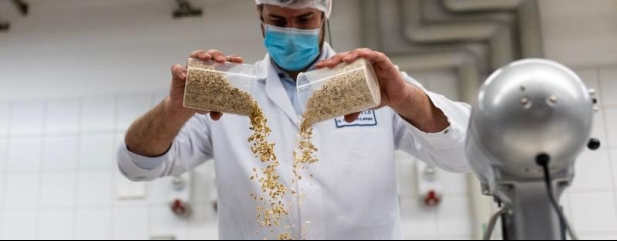Archived article
Please note that tax, investment, pension and ISA rules can change and the information and any views contained in this article may now be inaccurate.
Time to turn sweet on Tate & Lyle

Tate & Lyle (TATE) 645p
Market cap: £2.5 billion
Investors have soured on Tate & Lyle (TATE) since the global ingredients group announced the $1.8 billion (£1.4 billion) acquisition of ‘mouthfeel’ specialist CP Kelco in June.
The food producer’s shares have fallen more than 20% from May’s 831.5p five-year high on concerns over price and integration risk, since large acquisitions have an unfortunate habit of destroying rather than creating shareholder value.
Nevertheless, Shares believes this weakness presents a sweet entry point, since the sensible deal affords Tate & Lyle the opportunity to expand its profitable solutions business and increases its exposure to faster-growing markets in Asia, the Middle East and Latin America.
So long as Tate & Lyle continues to exhibit earnings resilience and delivers the cost and revenue synergies promised by the deal, there is scope to close a wide discount to peers.
According to Stockopedia, the shares trade on a grudging 11.7 times forecast 2025 earnings, almost half the 22.8 multiple ascribed to International Flavors & Fragrances (IFF:NYSE) and a massive discount to Switzerland’s Givaudan (GIVN:SWX) on 33.5 times.
WHAT DOES TATE & LYLE DO?
In recent years, Tate & Lyle has executed a major transformation to become a growth-focused speciality food and beverage solutions group, culminating in the recent sale of its remaining 49.7% interest in the low margin Primient starch business.
The £2.5 billion-cap is now returning the £215 million proceeds from the sale to shareholders through a share buyback.
The group, which sold its historic sugar business back in 2010, is now a North America-focused provider of ingredients and solutions to food and beverage companies, with a strong heritage in corn-derived products.
Guided by chief executive Nick Hampton, the FTSE 250 firm is well positioned for long-term growth given its strong franchise in sugar and calorie reduction, which plays into consumers’ demand for healthier food and drink.
On 25 July 2024, Hampton highlighted a ‘good start’ to the year to March 2025 with first-quarter group EBITDA (earnings before interest, tax, depreciation and amortisation) ahead year-on-year.
‘It’s encouraging to see volume momentum across the business, and we continue to expect volume growth to accelerate as the 2025 financial year progresses,’ insisted Hampton.
CHEWING OVER A TASTY DEAL
The acquisition of CP Kelco from J.M. Huber significantly increases Tate & Lyle’s scale in speciality food ingredients and should accelerate sales growth through greater exposure to higher-growth emerging markets and an increased opportunity to sell solutions to customers.
The acquired business is a global leader in pectins and speciality gums, an area in which Tate & Lyle doesn’t currently play, and in technologies which complement its existing product portfolio with limited risk of cannibalising sales.
The cash and shares acquisition should sweeten Tate & Lyle’s margins over the next few years, with at least $50 million in cost synergies expected by the end of the second year post-completion.
The deal creates a market leader in ‘mouthfeel’ – literally the way food or drink feels in the mouth – and the two ingredients firms share the same client base.
Simon Gergel, manager of Tate & Lyle shareholder The Merchants Trust (MRCH), believes the negative market reaction ‘may have reflected the headline price paid’, but sees opportunities to raise profitability in the acquired business.
‘I don’t think investors completely understood that CP Kelco was running at a slightly depressed level of profitability,’ he informed Shares recently. ‘The company had just spent a lot of money building up capacity in two plants, but that process had been quite disruptive for the business so the profit margins had fallen, which meant the headline multiple looked quite high.
‘By the time you factor in a recovery in profitability, and the synergy cost savings they should be able to get from putting the two businesses together, we don’t actually think the valuation was that high.’
Gergel sounded excited by a deal which gives Tate & Lyle ‘a step up to be world leader in the whole mouthfeel category’ and ‘really completes the transformation from what was historically a business with a large commodity ingredients element to towards much higher-margin and return-on-capital speciality ingredients’.
Encouragingly, CP Kelco’s trading in 2024-to-date has shown a return to volume growth in both pectins and gums while margins are also stabilising.
Analysts at Berenberg think in the longer term the transaction ‘should position Tate & Lyle towards higher-growth markets, with a strong margin tailwind’.
Important information:
These articles are provided by Shares magazine which is published by AJ Bell Media, a part of AJ Bell. Shares is not written by AJ Bell.
Shares is provided for your general information and use and is not a personal recommendation to invest. It is not intended to be relied upon by you in making or not making any investment decisions. The investments referred to in these articles will not be suitable for all investors. If in doubt please seek appropriate independent financial advice.
Investors acting on the information in these articles do so at their own risk and AJ Bell Media and its staff do not accept liability for losses suffered by investors as a result of their investment decisions.
Issue contents
Editor's View
Feature
Great Ideas
News
- Raspberry Pi dishes up new products just two months after its IPO
- Why engineering outfit Spirax Group is in a downward spiral
- Western businesses are finding life a grind in China
- Calm returns to markets ahead of Fed inflation test
- Beazley shares hit record high as profits almost double
- A dramatic shake-up of the US presidential race may take time to be felt in markets
 magazine
magazine








